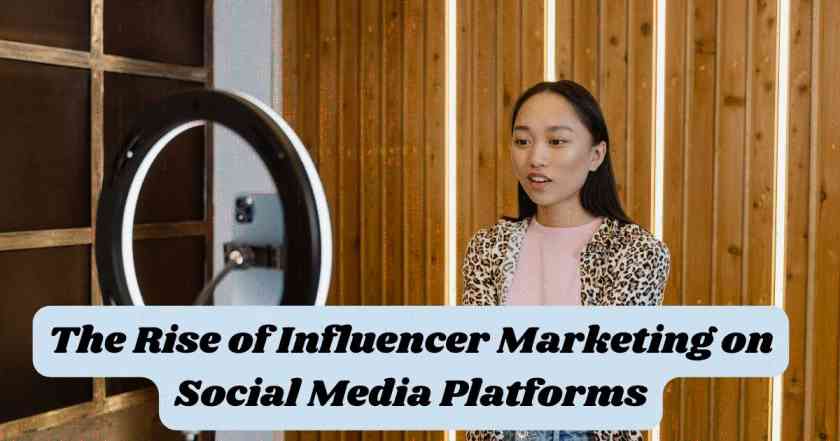Introduction
In the digital age, “influencer marketing” has become a powerful tool for brands to reach their target audiences. Social media platforms, such as Instagram and YouTube, have revolutionized the way companies connect with consumers. The rise of influencers, individuals with a large and engaged following, has reshaped traditional marketing strategies.
Today, influencer marketing is not just a trend but a fundamental aspect of digital marketing campaigns. Brands collaborate with influencers to promote their products or services authentically to a highly engaged audience. This form of marketing leverages the trust and credibility that influencers have built with their followers, leading to increased brand awareness and customer loyalty.
As social media continues to evolve, influencer marketing is expected to play an even more significant role in shaping consumer behavior and brand perception. The impact of influencer marketing goes beyond just promoting products; it has the power to influence purchasing decisions and shape trends in various industries.
In this section, we will explore the foundational concepts of influencer marketing and its transformative impact on social media platforms. We will delve into the strategies that have made influencer marketing a cornerstone of successful digital campaigns and examine the key benefits that brands can derive from collaborating with influencers. Additionally, we will discuss the challenges and pitfalls that brands may encounter in the dynamic landscape of social media influencer marketing. Let’s uncover the intricacies of this powerful marketing tool and its implications for brands and consumers alike.
Evolution of Social Media and Influencer Marketing
The evolution of social media and influencer marketing is deeply intertwined with the historical context of social media emergence. Social media platforms have revolutionized the way individuals communicate, share information, and connect with others in modern society. The rise of platforms like Facebook, Twitter, and Instagram has not only transformed personal interactions but has also had a profound impact on marketing practices.
As social media gained popularity, brands quickly recognized the potential to reach a vast audience in a more direct and engaging way. The interactive nature of social media allowed companies to create targeted campaigns, interact with consumers in real-time, and gather valuable insights into consumer behavior. This shift in marketing dynamics paved the way for the emergence of influencer marketing within social media platforms.
Influencer marketing leverages the power of individuals who have cultivated a loyal and engaged following on social media. These influencers have the ability to sway consumer opinions, drive purchasing decisions, and shape trends within their niche. Brands saw the opportunity to collaborate with influencers to tap into their credibility and authenticity, reaching a highly targeted audience in a more organic manner.
The evolution of social media and influencer marketing has blurred the lines between traditional advertising and authentic content creation. As consumers increasingly seek genuine connections and recommendations from trusted sources, influencer marketing has become a cornerstone of successful digital campaigns. This symbiotic relationship between social media platforms, influencers, and brands continues to shape the landscape of digital marketing in profound ways.
Key Players in Social Media Influencer Marketing
Building on the foundation of influencer marketing within social media platforms, it is essential to understand the key players that drive successful campaigns. These key players encompass a diverse range of influencers, each bringing unique strengths and characteristics to the table.
One of the primary distinctions lies in the types of influencers involved in social media marketing. From celebrities with massive followings to micro-influencers with niche audiences, each category offers distinct advantages for brands. While celebrities can provide broad reach and visibility, micro-influencers often offer higher engagement rates and more targeted connections with their followers. Finding the right balance between reach and engagement is crucial in selecting the most suitable influencers for a campaign.
Effective influencers share common characteristics that contribute to their success in driving brand awareness and engagement. Authenticity, relatability, and credibility are key traits that resonate with audiences and build trust. Influencers who can seamlessly integrate brand messaging into their content while maintaining their unique voice are more likely to foster genuine connections with their followers.
Successful influencer collaborations serve as prime examples of the power of strategic partnerships in social media marketing. Brands that align with influencers whose values align with their own can create impactful campaigns that resonate with their target audience. Whether it’s a beauty brand partnering with a makeup artist for a product launch or a fitness company collaborating with a health enthusiast for a wellness campaign, the synergy between brands and influencers can yield impressive results.
By understanding the different types of influencers, recognizing the characteristics of effective influencers, and studying successful collaborations, brands can navigate the complex landscape of social media influencer marketing with confidence and creativity.
Benefits of Social Media Influencer Marketing
The “Benefits of Social Media Influencer Marketing” are multifaceted and impactful. One significant advantage is the increased brand visibility and awareness that influencers can bring to a campaign. By leveraging the reach and influence of these individuals, brands can tap into new audiences and enhance their presence in the digital landscape.
Moreover, social media influencer marketing offers enhanced credibility and trust for brands. When an influencer authentically promotes a product or service, their endorsement can resonate with followers who trust their recommendations. This trust translates into credibility for the brand, fostering positive associations and building a loyal customer base.
In addition to credibility, influencer marketing often leads to higher engagement and conversion rates. Influencers have the ability to create authentic and engaging content that resonates with their audience, resulting in increased interactions and ultimately driving conversions for the brand. This personalized approach can significantly impact the success of marketing campaigns on social media platforms.
Furthermore, one of the key advantages of social media influencer marketing is its cost-effectiveness compared to traditional marketing methods. Collaborating with influencers can be a more affordable way for brands to reach their target audience effectively. This cost efficiency, coupled with the potential for high returns on investment, makes influencer marketing a valuable strategy for brands looking to maximize their marketing efforts in a competitive digital landscape.
Overall, the benefits of social media influencer marketing encompass increased brand visibility, enhanced credibility, higher engagement and conversion rates, and cost-effectiveness, making it a powerful tool for brands seeking to connect with consumers in a meaningful and impactful way.
Challenges and Pitfalls in Social Media Influencer Marketing
Authenticity and transparency are paramount in social media influencer marketing, yet they pose significant challenges for brands. Consumers are becoming increasingly savvy and can easily detect inauthentic endorsements or undisclosed sponsorships. This raises concerns about the credibility of influencer content and the trustworthiness of brand partnerships. Maintaining authenticity and transparency is crucial to avoid alienating followers and damaging brand reputation.
Another challenge in influencer marketing is the inherent risk of controversies and scandals involving influencers. Brands may face backlash if an influencer they collaborate with engages in inappropriate behavior or becomes embroiled in a scandal. Such incidents can tarnish the brand’s image and erode consumer trust, highlighting the importance of thorough vetting and ongoing monitoring of influencers.
Measuring the return on investment (ROI) and the effectiveness of influencer campaigns can also be a daunting task for brands. Unlike traditional marketing channels where metrics are more straightforward, attributing conversions and engagement directly to influencer partnerships can be complex. Determining the impact of influencer collaborations on brand awareness, sales, and customer loyalty requires sophisticated analytics tools and a deep understanding of social media algorithms.
Navigating these challenges in social media influencer marketing demands a proactive approach, clear communication, and a willingness to adapt to evolving trends and consumer preferences. By prioritizing authenticity, conducting due diligence when selecting influencers, and leveraging data-driven insights, brands can mitigate risks, maximize the benefits of influencer partnerships, and build long-term relationships with their target audience.
Strategies for Successful Social Media Influencer Marketing Campaigns
Building successful social media influencer marketing campaigns requires a strategic approach that encompasses various key elements.
To begin with, identifying the right influencers for your brand is crucial. It’s essential to collaborate with influencers whose values, audience demographics, and content align with your brand identity and target market. Conduct thorough research to ensure that the influencers you choose have genuine engagement and credibility within their community.
Establishing clear goals and objectives is another vital aspect of a successful influencer marketing campaign. Define what you aim to achieve, whether it’s increasing brand awareness, driving website traffic, or boosting sales. Setting specific, measurable, achievable, relevant, and time-bound (SMART) goals will provide a clear roadmap for your campaign and help track its success.
Creating engaging and authentic content is key to capturing the attention of both the influencer’s followers and your target audience. Encourage influencers to develop content that resonates with their audience while subtly integrating your brand message. Authenticity is paramount in building trust and credibility with consumers, so ensure that the content feels natural and aligns with the influencer’s usual style.
Measuring and analyzing campaign performance is essential for evaluating the effectiveness of your influencer partnerships. Utilize social media analytics tools to track key performance indicators (KPIs) such as engagement rates, click-through rates, and conversions. By analyzing these metrics, you can gain valuable insights into what resonates with your audience, optimize future campaigns, and demonstrate the ROI of your influencer marketing efforts.
By implementing these strategies, brands can enhance the success of their social media influencer marketing campaigns, forge meaningful connections with their target audience, and achieve their marketing objectives effectively.
Future Trends and Predictions
The future of influencer marketing on social media platforms is poised for significant evolution driven by emerging technologies and shifting strategies. One key aspect shaping this landscape is the impact of emerging technologies such as AI and virtual reality. These technologies are revolutionizing how influencers engage with their audiences, offering more personalized and immersive experiences. Brands are increasingly exploring AI-powered tools for influencer selection, content optimization, and performance tracking, enhancing the effectiveness and efficiency of their campaigns.
In addition to technological advancements, the evolution of influencer marketing strategies and tactics is expected to continue. As the market becomes more saturated, influencers and brands will need to innovate to stand out and capture audience attention. This evolution may involve a shift towards micro and nano influencers, who offer niche audiences and higher engagement rates. Collaborations with these smaller influencers can lead to more authentic and relatable content, resonating better with consumers.
Furthermore, potential regulatory changes could have significant implications for influencer marketing practices. As authorities worldwide scrutinize influencer disclosures, transparency, and authenticity, brands and influencers will need to adapt to stricter guidelines and regulations. This shift towards more transparency and accountability may reshape the dynamics of influencer partnerships and require a more ethical and compliant approach to content creation and promotion.
Overall, the future trends and predictions for influencer marketing on social media platforms point towards a landscape shaped by technology-driven innovation, strategic evolution, and regulatory compliance. Brands and influencers that embrace these changes and adapt their approaches accordingly are likely to thrive in this dynamic and competitive environment.






